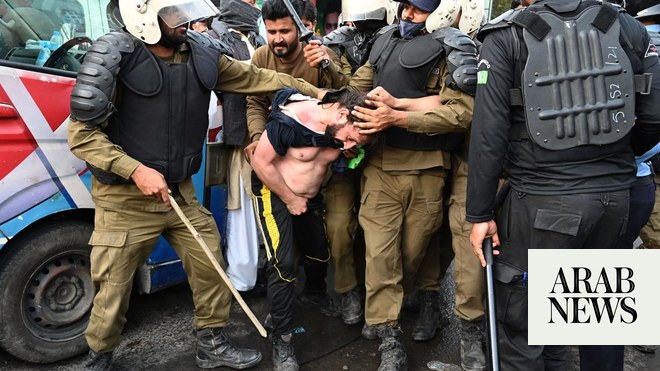
"Pakistan’s relationship with the US should be mutually beneficial ... We will opt for balanced relations with the US," the Pakistan Tehrik-e-Insaf (PTI) chairman said
"Peace in Afghanistan means peace in Pakistan," Khan said in his victory speech
ISLAMABAD: Pakistan Tehreek-e-Insaf (PTI) chairman Imran Khan, in his victory speech on Thursday, said that he will strive to make the country a “welfare state” by introducing reforms in state institutions, as well as improving foreign policy.
“It is my inspiration to help the poor and downtrodden. We will make all our policies for human development,” he said, adding that no country could make progress where policies were made to favor a "small elite."
Calling it a "historic election in Pakistan," the prime minister-in-waiting said that unprecedented participation was seen by the elderly, the disabled, women, and expatriates. He said that "there was terrorism in this election" but people came out in large numbers to "strengthen democracy."
Khan that after a 22-year long struggle, he finally had the chance to implement what he has been advocating.
Talking about issues that would be on his priority list, he said that he would spend public tax money to improve education and health facilities to benefit the poor. Half of Pakistan’s population was living below the poverty line while "45 percent of children have stunted growth," he said.
Khan said that 25 million children were out of school and the female fatality rate during childbirth in Pakistan was one of the highest, adding that all of his policies would be "focused on human development."
He also vowed to root out corruption and improve governance. “The accountability will start from the prime minister and go down to ministers,” he said, adding that the rule of law for all would be ensured.
Khan said that his government would also improve tax culture and expect people to pay taxes as their money would be spent on their betterment.
He said that the country’s economy was in shambles due to "dysfunctional institutions," adding that the trade and economic deficits of Pakistan were the highest in the world and special measures were required to fix the economy.
“Overseas Pakistanis are our biggest asset and we will invite them to invest in Pakistan,” he said, vowing to safeguard the public’s money.
On the foreign policy front, Khan acknowledged that he was confronted with a "very big foreign policy challenge" that he would try to address by improving relations with neighboring and Islamic countries.
"Saudi Arabia is a friend who has always stood by us in difficult times. Our aim will be that whatever we can do for conciliation in the Middle East, we want to play that role. Those tensions, that fight, between neighbors, we will try to bring them together,” he said.
He also vowed to strengthen relations with China as the country had invested billions of dollars in the China Pakistan Economic Corridor (CPEC).
“We want to learn from China, how they brought 700 million people out of poverty ... The other thing we can learn from China is ... the measures they have taken against corruption, how they have arrested more than 400 ministers there,” he said.
Of Afghanistan, he said the Afghans had suffered the most in the war on terror and “peace in Afghanistan means peace in Pakistan.” He said that he would like to see Pakistan have an open border with Afghanistan like the EU.
“Pakistan’s relationship with the US should be mutually beneficial ... up until now, that has been one way. We will opt for balanced relations with the US,” he said.
Khan said that the leadership of Pakistan and India should sit across the table to negotiate core issues, including Kashmir. “We should move forward to end poverty in both the countries,” he said, adding that the Indian media had portrayed him in the past couple of days as the “villain of a Bollywood film.”
He said that trade ties between Pakistan and India would help to improve the economy of both countries and “if India is ready for negotiations, we can move forward.”
Rasul Bukhsh Rais, a political analyst, said that it was a big challenge to improve public services in Pakistan as all institutions were in shambles. “It is for the first time that a prime minister-elect has pledged to improve the public services and let’s see, hope for the best,” he told Arab News.
He said that people had voted Khan to power due to his party’s five-year performance in Khyber Pakhtunkhwa (KP) province during 2013 to 2018. “If sufficient resources are allocated for education and health, and their utilization is properly audited, we will witness a significant improvement in a short span of time,” he said.
Tahir Malik, professor of international relations at the National University of Modern Languages (NUML) Islamabad, said that Khan appeared to be ambitious in his speech on foreign policy towards the US and India.
“This is positive but requires a more institutional approach to improve relations with the US and India. Otherwise, it is just rhetoric,” he told Arab News.
Malik said that in today’s world no country could make progress in any field of life without improving its relationship with neighboring countries, especially international powers.
“Let’s hope Imran will use his charisma and personal relations to improve Pakistan’s relations with other countries, especially India and the US,” he said.












